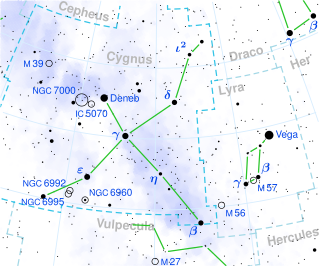
Summary
55 Cygni (55 Cyg) is a blue supergiant star in the constellation Cygnus. It is thought to be a member of the Cygnus OB7 stellar association at about 2,700 light years.
| Observation data Epoch J2000 Equinox J2000 | |
|---|---|
| Constellation | Cygnus |
| Right ascension | 20h 48m 56.29119s[1] |
| Declination | +46° 06′ 50.8824″[1] |
| Apparent magnitude (V) | 4.86[2] (4.81 - 4.87[3]) |
| Characteristics | |
| Spectral type | B2.5Ia[4] - B4Ia[5] |
| U−B color index | −0.45[2] |
| B−V color index | +0.42[2] |
| Variable type | L[3] or α Cyg[6] |
| Astrometry | |
| Radial velocity (Rv) | −7.2[7] km/s |
| Proper motion (μ) | RA: −2.65[1] mas/yr Dec.: −2.84[1] mas/yr |
| Parallax (π) | 1.40 ± 0.17 mas[1] |
| Distance | 830[8] pc |
| Absolute magnitude (MV) | −6.93[8] - −7.26[9] |
| Details[6] | |
| Mass | 23[9] M☉ |
| Radius | 54 - 65 R☉ |
| Luminosity | 324,000 - 478,000 L☉ |
| Surface gravity (log g) | 2.35 - 2.50 cgs |
| Temperature | 18,600 - 19,000 K |
| Rotational velocity (v sin i) | 61[9] km/s |
| Other designations | |
| Database references | |
| SIMBAD | data |

Its apparent magnitude is 4.86, but this is slightly variable and the star is also called V1661 Cyg. When first analysed, it was classified as an irregular supergiant variable,[11] but subsequent studies have treated it as an Alpha Cygni variable. It shows pulsations with multiple periods from a few hours to 22 days, and both p- and g-modes.[6] Apart from p- and g-modes, strange mode and associated instabilities have also been found in models of this star.[12] The spectrum also shows variation, leading to different classifications being given for the star.[13]
The exact properties of 55 Cygni are not known precisely and are also variable. It is a hot luminous supergiant several hundred thousand times as luminous as the sun. This star was originally a standard for the B3 Ia spectral type.[14]
The type of pulsations that 55 Cyg exhibits suggest that it was previously a red supergiant that has shed its outer layers. The most massive red supergiants are expected to pass through a blue supergiant phase before becoming a Wolf-Rayet star and eventually exploding as a type Ib or Ic supernova.[6]
References edit
- ^ a b c d e Van Leeuwen, F. (2007). "Validation of the new Hipparcos reduction". Astronomy and Astrophysics. 474 (2): 653–664. arXiv:0708.1752. Bibcode:2007A&A...474..653V. doi:10.1051/0004-6361:20078357. S2CID 18759600.
- ^ a b c Ducati, J. R. (2002). "VizieR Online Data Catalog: Catalogue of Stellar Photometry in Johnson's 11-color system". CDS/ADC Collection of Electronic Catalogues. 2237. Bibcode:2002yCat.2237....0D.
- ^ a b Samus, N. N.; Durlevich, O. V.; et al. (2009). "VizieR Online Data Catalog: General Catalogue of Variable Stars (Samus+ 2007-2013)". VizieR On-line Data Catalog: B/GCVS. Originally Published in: 2009yCat....102025S. 1. Bibcode:2009yCat....102025S.
- ^ Prinja, R. K.; Massa, D. L. (2010). "Signature of wide-spread clumping in B supergiant winds". Astronomy and Astrophysics. 521: L55. arXiv:1007.2744. Bibcode:2010A&A...521L..55P. doi:10.1051/0004-6361/201015252. S2CID 59151633.
- ^ Zorec, J.; Cidale, L.; Arias, M. L.; Frémat, Y.; Muratore, M. F.; Torres, A. F.; Martayan, C. (2009). "Fundamental parameters of B supergiants from the BCD system. I. Calibration of the (λ_1, D) parameters into Teff". Astronomy and Astrophysics. 501 (1): 297–320. arXiv:0903.5134. Bibcode:2009A&A...501..297Z. doi:10.1051/0004-6361/200811147. S2CID 14969137.
- ^ a b c d Kraus, M.; Haucke, M.; Cidale, L. S.; Venero, R. O. J.; Nickeler, D. H.; Németh, P.; Niemczura, E.; Tomić, S.; Aret, A.; Kubát, J.; Kubátová, B.; Oksala, M. E.; Curé, M.; Kamiński, K.; Dimitrov, W.; Fagas, M.; Polińska, M. (2015). "Interplay between pulsations and mass loss in the blue supergiant 55 Cygnus = HD 198 478". Astronomy & Astrophysics. 581: A75. arXiv:1507.01846. Bibcode:2015A&A...581A..75K. doi:10.1051/0004-6361/201425383. S2CID 55392478.
- ^ Wilson, Ralph Elmer (1953). "General catalogue of stellar radial velocities". Washington. Bibcode:1953GCRV..C......0W.
- ^ a b Markova, N.; Puls, J. (2008). "Bright OB stars in the Galaxy. IV. Stellar and wind parameters of early to late B supergiants". Astronomy and Astrophysics. 478 (3): 823. arXiv:0711.1110. Bibcode:2008A&A...478..823M. doi:10.1051/0004-6361:20077919. S2CID 14510634.
- ^ a b c Searle, S. C.; Prinja, R. K.; Massa, D.; Ryans, R. (2008). "Quantitative studies of the optical and UV spectra of Galactic early B supergiants. I. Fundamental parameters". Astronomy and Astrophysics. 481 (3): 777. arXiv:0801.4289. Bibcode:2008A&A...481..777S. doi:10.1051/0004-6361:20077125. S2CID 1552752.
- ^ "/ftp/cats/more/HIP/cdroms/cats". Centre de Données astronomiques de Strasbourg. Strasbourg astronomical Data Center. Retrieved 27 November 2022.
- ^ Lefèvre, L.; Marchenko, S. V.; Moffat, A. F. J.; Acker, A. (2009). "A systematic study of variability among OB-stars based on HIPPARCOS photometry". Astronomy and Astrophysics. 507 (2): 1141. Bibcode:2009A&A...507.1141L. doi:10.1051/0004-6361/200912304.
- ^ Yadav, Abhay Pratap; Glatzel, Wolfgang (2016). "Stability analysis, non-linear pulsations and mass loss of models for 55 Cygni (HD 198478)". Monthly Notices of the Royal Astronomical Society. 457 (4): 4330–4339. Bibcode:2016MNRAS.457.4330Y. doi:10.1093/mnras/stw236. ISSN 0035-8711.
- ^ Maharramov, Y. M. (2013). "Spectral variability of the STAR 55 Cyg B3 Ia". Astronomy Reports. 57 (4): 303–309. Bibcode:2013ARep...57..303M. doi:10.1134/S1063772913030037. S2CID 121606849.
- ^ Morgan, W. W.; Roman, Nancy G. (1950). "Revised Standards for Supergiants on the System of the Yerkes Spectral Atlas". Astrophysical Journal. 112: 362. Bibcode:1950ApJ...112..362M. doi:10.1086/145351.



